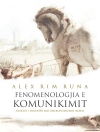In recent decades, social and economic changes have brought about a growing awareness of the role of art and culture in society. As a result, scholars have turned their attention to a sociological view of arts, developing hermeneutic approaches and conducting empirical research that have led to a wealth of insights into the organization of arts. These studies of the creation, production, distribution, evaluation and consumption of arts are clearly sociological, but they include approaches from other disciplines, notably arts management studies and cultural policy research. Volker Kirchberg and Tasos Zembylas critically discuss seven major theories of the social organization of arts in Western societies, with the aim of encouraging further research and theoretical developments.
Yazar hakkında
Tasos Zembylas (Prof. Dr.) lehrt Kulturbetriebslehre an der Universität für Musik und Darstellende Kunst in Wien.












